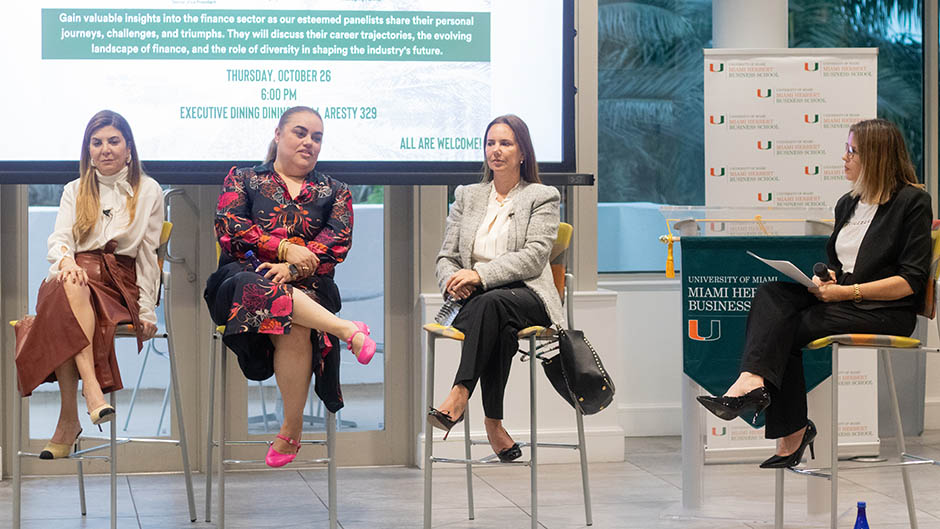Students attending the evening event received an unvarnished look at the challenges, failures, and triumphs experienced by a trio of high-powered female executives who’ve been mastering the wealth-management realm for decades.
“I never have a single day that looks just like the day before, and I have been doing this for over 24 years,” Amerant Bank Chief Fiduciary Officer, Head of Trust, and Senior V.P. Madelayne Cordero told the event’s moderator, Miami Herbert Lecturer Leila Pinto.
“A lot of my work revolves around client relations,” Cordero continued. “Being a trusted advisor means that, whether we want it or not, we kind of have a starring role in all the family drama! So, we are involved with all the beneficiaries, and we are involved with the clients.
“One of the cool aspects of my job is client entertainment. I’m not going to lie—that can be really, really sweet,” Cordero said, prompting nods from her fellow panelists, JPMorgan Private Bank Managing Director Annick Iwanowski, and EKANTA Wealth Advisors Managing Partner Nova Madueño.
“There’s a saying that says, if you have fun with what you’re doing, you will never have to work a day in your life,” Madueño chimed in. “This is achievable in this area, believe me.
“Every single day is different because you deal with clients all day long,” Madueño said. “And every single person, every single client, every single family is different. I probably get to the office at 9:30 or 10. And then it’s nonstop because you have one call, then another call, then portfolio reviews, then deciding what to invest, then seeing what the market is doing. Even though it’s stressful, you can have a lot of fun with it.”
After only a few minutes of listening to Cordero, Iwanowski, and Madueño, it was clear to the students present that wealth advisors are typically well-compensated and work long days, but have to be people-oriented to succeed.
“This question is for all of you,” moderator Leila Pinto alerted the panelists. “There are a lot of things happening right now. High interest rates, inflation, the invasion of Ukraine, the Middle East, supply chain issues, and OPEC cutting the production of oil. How has this affected the types of products and services you offer your clients?”
“The way that we position ourselves when we talk to our clients about what is going on is, you need to have a long-term strategy,” answered JPMorgan Private Bank’s Annick Iwanowski. “When you manage portfolios, you don’t manage portfolios for one month . . . six months . . . one year or two years. You manage portfolios for five to six years, maybe longer.
“So, you have a long-term view, long-term asset allocations, long-term positioning, and then you do some things that are short-term and opportunistic,” Iwanowski explained. “And that’s what excites me about what I do. It’s cool to deal with these challenges while looking at them as opportunities.”
If a student wanted to do wealth management work after graduation, Pinto asked, what skillset would they need?
“I will tell you the same thing that I was told at 22,” Cordero answered. “You need to be willing to adapt and just be willing to grow and learn every day. The technical side can definitely be taught. I would love to tell you that I’m a rocket scientist, but I’m not.
“You have to be okay with being personable, and having a certain level of vulnerability with your clients,” said Cordero, who travels frequently to meet clients in the United States and Latin America. “It’s not just about the numbers or capital preservation . . . you have to be sensitive to a lot of the issues they deal with. You have to know that they’re entrusting you with their next generation and beyond that.”
As the hourlong event wound down, a student asked the panelists: “How would you deal with a stubborn client who doesn’t want to follow your advice, or just wants things their own way?”
The query elicited a knowing smile from moderator Pinto, who spent more than 14 years managing wealth management portfolios for top international financial institutions, including Deutsch Bank.
“When I started my career in banking, I was very young,” Pinto recalled. “I was trying to explain a portfolio to some clients and they just looked at me like I was selling candy or something. They didn’t respect me at all. At first, I thought it was because I was young. Second, I thought it was because I was a woman.
“But the main thing was, I didn’t have the knowledge and they could see it. I was talking nonsense! So, I went the extra mile, I read market reports and I went to senior bankers, and I listened . . . try to talk to senior colleagues who have been there longer than you. Learn from them, which will give you self-confidence and knowledge. Slowly, your clients are going to listen to you and trust you. And you’re going to become a good banker, regardless of whether you’re a woman or a man. That’s my advice.”

